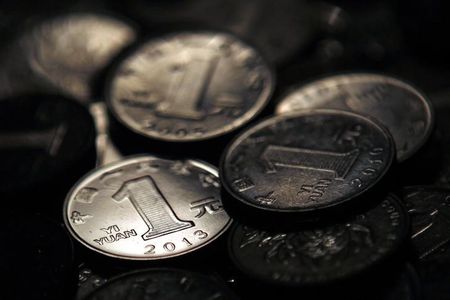By Engen Tham and Jake Spring
SHANGHAI/BEIJING (Reuters) - A bid by China to rein in its "shadow banking" activity is producing results, thanks to slowing economic growth and tighter regulation.
But some success for a policy drive to curb risky lending is not all good news for Beijing, as smaller companies may face even bigger struggles to find funding. A cut in interest rates, announced by Beijing on Friday, is unlikely to help them much.
Shadow banking includes off-balance-sheet forms of bank finance plus lending by non-traditional institutions, all of which is less regulated than formal lending and thus considered riskier.
At the end of 2013, China had the world's third-largest shadow banking sector, according to the Financial Stability Board, a task force set up by the G20 economies. It estimated that Chinese assets of "other financial intermediaries" than traditional ones were then just under $3 trillion (1.92 trillion pounds).
In the three months ended Sept. 30, the shadow banking portion of what China calls total social financing - a broad measure of liquidity in the economy - contracted for the first time on a quarterly basis since the 2008/09 financial crisis.
Loans extended by trust companies fell by roughly 100 billion yuan (10.44 billion pounds). Bankers' acceptances, a short-term method of financing regularly used by manufacturers, dropped 668.3 billion yuan, according to Reuters calculations based on central bank data.
October lending data, released last week, showed further contractions in these types of shadow banking.
Bankers' acceptances and trust loans "fall into categories that have been squeezed by tightening regulations in the last few months, so it's an ongoing trend," said Donna Kwok, an economist at UBS in Hong Kong.
Trusts have grown more risk averse as regulations tighten, hampering growth. Rules issued in April by the China Banking Regulatory Commission (CBRC) hold officers personally accountable for irresponsible lending and requires shareholders to inject capital and liquidity when necessary.
CHANGED REGULATIONS
Cissy Sun, a risk manager at Anxin Trust Co Ltd (SS:600816), said the industry has been hit by regulations prohibiting trusts from using pooled funding. Previously, funds a trust collected from investors buying different products were packaged into loans for a property developer or other borrower.
Trust companies have cut investment in property as its profitability has fallen, she said. China's house prices suffered their biggest annual decline in nearly four years in October.
Making loans to sectors other than real estate will be slowed by the need to learn a different set of industry regulations, Sun said.
Bankers' acceptances have contracted as a result of the manufacturing slowdown and tighter regulations.
China's factory output growth hit a six-year low in August, rebounding only slightly since then. In half-year reports, Chinese banks said non-performing loans for manufacturing increased.
SMALL IS NOT BEAUTIFUL
Lending to small and medium-sized manufacturers has been tightened due to worries about defaults, according to a banker who oversees issuance of acceptance notes for a big Chinese bank.
Bankers acceptances used to be short-term tools for commercial banks to shore up deposits to meet targets. But in 2011, China's banking regulator changed accounting rules, so cash collected via acceptances could no longer boost deposits.
As a result, acceptances fell from favour, according to bankers.
For Beijing, curbing risky forms of lending might undercut a stated goal of expanding lending to small and medium-sized enterprises (SMEs).
Major banks often avoid lending to smaller companies, preferring to have state-owned enterprises as borrowers.
However, the government recognises that innovative SMEs will be drivers of the economy and a primary source for job growth in the future.
"We can't just say 'no' to shadow banks, because to some extent, they satisfy some financing demands of a diversified economy," the Xinhua news agency quoted Hu Xiaolian, a central bank vice governor, as saying in September.

(Editing by Richard Borsuk)